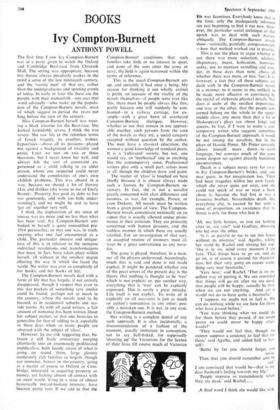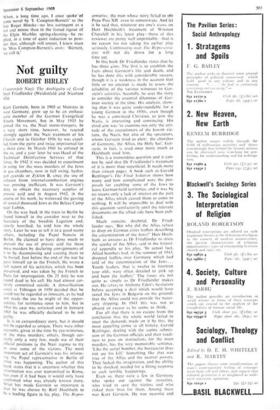BOOKS Ivy C ompton-Burnett
ANTHONY POWELL
The first time I saw Ivy Compton-Burnett was at a party given to watch the Oxford and Cambridge Boat-race from Chiswick Mall. The setting was appropriate, because this fixture always peculiarly evokes in the mind a sense of the late nineteenth century, and the 'varsity men' of that era, rather than the undergraduates and sporting events of today. In early or later life these are the people, with their womenfolk—one uses that word advisedly—who make up the popula- tion of the Compton-Burnett novels, most of which suggest in period the years not long before the turn of the century.
Miss Compton-Burnett herself was wear- ing a black tricorne for the Boat-race. She looked formidably severe. I think she was severe. She saw life in the relentless terms of Greek tragedy, its cruelties, irOnies, hypocrisies—above all its passions—played out against a background of triviality and ennui. Later we met on two or three occasions, but I never knew her well, and always felt the sort of constraint ex- perienced as a child talking to an older person, whom one suspected could never understand the complexities of one's own childish problems. This was absurd in a way, because we shared a lot of literary likes and dislikes (she wrote to me of Emily Brontë: 'Posterity has paid its debt to her too generously, and with too little under- standing'), and we might be said to have `got on' together very well.
I think the explanation of my sense of unease was no more and no less than what has been said; Ivy Compton-Burnett em- bodied in herself a quite unmodified pre- 1914 personality, so that one was, in truth, meeting what one had encountered as a child. The particular interest and unique- ness of this is in relation to the immense individual revolutions and transformations that must, in fact, have taken place within herself, all without in the smallest degree effecting the way in which she faced the world. No writer was ever so completely of her books, and her books of her.
The Compton-Burnett novels deal with a form of life that has largely, if not entirely disappeared, though I suspect that even to this day pockets of something very similar could be found; perhaps not so much in the country, where the novels tend to be located, as in residential suburbs and sea- side towns. As with all good writers, a fair amount of nonsense has been written about her subject matter, so that one hesitates to generalise for fear of adding to it, especially in these days when so many people are obsessed with the subject of 'class'.
However, let me risk suggesting that, be- tween a still lively aristocracy merging effortlessly into an enormously proliferated middle-class, both keenly aware of what is going on round them, large gloomy moderately rich families in largish, though not immense, houses in the country, going as a matter of course to Oxford or Cam- bridge, interested in acquiring property or money, yet lacking almost all contact with an outer world, living in a state of almost hysterically inward-looking intensity, have become pretty rare. If we add to that the Compton-Burnett conditions that such families take little or no interest in sport, and none of the sons enter the army or navy, the field is again narrowed within the terms of reference.
This is the usual Compton-Burnett set- up, and certainly it had once a being. My reason for thinking it not wholly extinct is partly on account of the vitality of the novels themselves—if people were ever like this, there must be people always like this; partly because one will suddenly be con- fronted—in a railway carriage, for ex- ample—with a great burst of overheard Compton-Burnett dialogue. However, whether or not they remain in any appreci- able number, such persons form the core of the novels as they are, a social category accepted without question by the author. The men have a classical education, the women a good knowledge of standard poets. It is a `cultivated' society, but not, one would say, an `intellectual' one in anything like the contemporary sense. Professional writers play only a small part, artists none at all, though the children draw and paint.
The matter of `class' is touched on here chiefly because it is almost always made such a feature by Compton-Burnett re- viewers. In fact, she is not a novelist greatly concerned with class differences and nuances, as was, for example, Proust, or even Dickens. All novels must be written from a given point of view. The Compton- Burnett novels concentrate minimally on an aspect that is usually allowed undue prom- inence in their criticism. They are primarily concerned with human passions, and the ruthless manner in which these are usually satisfied. For an investigation of that sort, an accepted routine of manners must al- ways be a great convenience to any nove- list.
The game is played, therefore, in a man- ner all the players understand. Accordingly, much that is said and done is not made explicit. It might be pondered whether one of the great errors of the present day is the theory that nothing is thought to be `true' which is not explicit; or, put another way, everything that is `true' can be explicitly expressed. This is surely a great mistake. Life itself is not explicit. To write of it explicitly on all occasions is just as much an author's convention as any other; pos- sibly a mistaken one. It is not, in any case, the Compton-Burnett method.
Her writing is a complete denial of any such approach. It is also, incidentally, a discommendation of a fashion of the moment, usually immature in conception, not to say half-baked, for supposedly `showing up' the Victorians for the licence of their lives. Of course much of Victorian
life was licentious. Everybody knew that at the time; only the inadequately informed are just beginning to find it out now. How- ever, the particular social technique of that epoch was to deal with such matters obliquely. The Compton-Burnett novels show—satirically, painfully, compassionately —how that method worked out in practice.
This is not the place to argue whether or not there was more seduction, adultery, illegitimacy, incest, lesbianism, homosex- uality, not to mention swindling and mur- der, in those days than now; above all whether there was more, or less, `fun'. It is, however, a fact that all these subjects are dealt with in the Compton-Burnett novels in a manner, so it seems to me, unlikely to be made more effective or convincing by the recital of elaborate physical details. Nor does it seem of the smallest importance, one way or the other, that the people con- cerned belong on the whole to the upper- middle class; any more than that a lot of Shakespeare's plays are about kings and queens. In fact, if I were to name a con- temporary writer who suggests something of the Compton-Burnett approach, it would be not among the novelists, but in the plays of Harold Pinter. Mr Pinter certainly allows himself more down - to - earth language, but conveys much of the same ironic despair set against drearily humdrum circumstances.
Death is a subject never very far away in Ivy Compton-Burnett's books, and, one may guess, in her imagination too. There had been tragedies within her own family which she never quite got over, and she could not speak of war or read a book about it, because she had lost in war a favourite brother. Nevertheless death, like everything else, is treated by her with a sense of proportion, an awareness that its threat is only for those who fear it.
`Ah, my little hostess, so you are looking after us, are you?' said Godfrey, throwing one leg over the other.
'It is so painful to me to see this house without its mistress,' said Agatha, taking her stand by Rachel and stirring her cup. She is in my mind every moment I am here. That things have to go on, and do go on, is of course a ground for thankful- ness, but their very going on causes some- thing very near heartache.'
`Very near,' said Rachel. 'That is an ex- cellent way of putting it. We are reminded that things will go on after we are dead. that people will be happy, actually be that, when we are not anything. And yet it would not do to have quite a heartache.' 'I suppose we ought not to feel it. We can do nothing while we are here for those who have passed before.'
`You were thinking what we could do for them before they passed, if we could prove we could never be happy after- wards?'
`They would not feel that, though we cannot suppress a tendency to feel that for them,' said Agatha, and added half to her- self : `Better by far you should forget and smile, Than that you should remember and be sad. I am convinced that would be—that is my dear husband's feeling towards my life.' `People improve so tremendously when they are dead,' said Rachel....
, A final word I think she would like said.
When, a long time ago, I once spoke of
some novel by Compton-Burnett' to the late Roger Hincks—no less astringent as a wit and mimic than in the famed rigour of his Elgin Marbles spring-cleaning—he re- plied, in a tone of quiet reduction to pow- der that, although still unmet, I knew must be Miss Compton-Burnett's own: 'Burnett, we call it.'



































 Previous page
Previous page